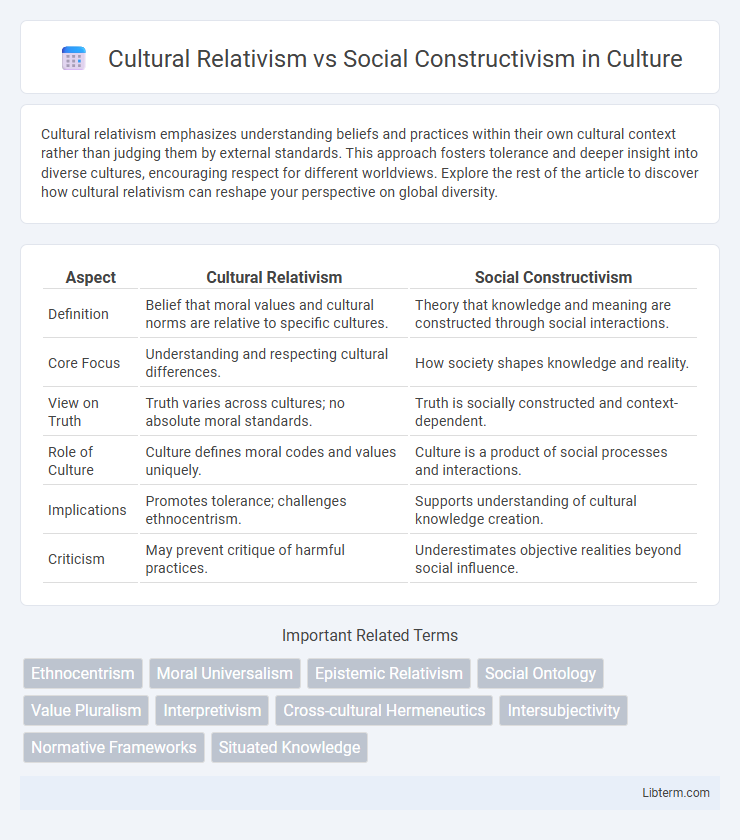Cultural relativism emphasizes understanding beliefs and practices within their own cultural context rather than judging them by external standards. This approach fosters tolerance and deeper insight into diverse cultures, encouraging respect for different worldviews. Explore the rest of the article to discover how cultural relativism can reshape your perspective on global diversity.
Table of Comparison
| Aspect | Cultural Relativism | Social Constructivism |
|---|---|---|
| Definition | Belief that moral values and cultural norms are relative to specific cultures. | Theory that knowledge and meaning are constructed through social interactions. |
| Core Focus | Understanding and respecting cultural differences. | How society shapes knowledge and reality. |
| View on Truth | Truth varies across cultures; no absolute moral standards. | Truth is socially constructed and context-dependent. |
| Role of Culture | Culture defines moral codes and values uniquely. | Culture is a product of social processes and interactions. |
| Implications | Promotes tolerance; challenges ethnocentrism. | Supports understanding of cultural knowledge creation. |
| Criticism | May prevent critique of harmful practices. | Underestimates objective realities beyond social influence. |
Introduction to Cultural Relativism and Social Constructivism
Cultural relativism emphasizes understanding beliefs and practices within their own cultural context, rejecting universal standards for judging cultural norms. Social constructivism asserts that knowledge and reality are shaped through social interactions and shared meanings within specific communities. Both frameworks challenge fixed notions of truth by highlighting the influence of cultural and social factors on perception and understanding.
Defining Cultural Relativism
Cultural relativism is an anthropological principle asserting that beliefs, values, and practices should be understood based on an individual's own culture rather than judged against external standards. It promotes the idea that moral codes and social norms are culturally bound and vary across societies, emphasizing context-specific interpretations of human behavior. Distinct from social constructivism, cultural relativism centers on cultural differences without necessarily focusing on how knowledge or reality is constructed through social interactions.
Understanding Social Constructivism
Social Constructivism emphasizes that knowledge and meaning are created through social interactions and shared experiences within specific cultural and historical contexts. This theory asserts that reality is not fixed but constructed by individuals and communities through language, symbols, and collective practices. Understanding Social Constructivism involves recognizing how social processes shape perceptions, values, and norms, contrasting with Cultural Relativism's focus on evaluating cultures based on their own standards.
Historical Origins of Both Concepts
Cultural relativism originated in the early 20th century through anthropologists like Franz Boas, who emphasized understanding cultures within their own contexts, opposing ethnocentric bias. Social constructivism emerged mid-20th century, influenced by sociologists and psychologists such as Peter Berger and Thomas Luckmann, emphasizing that knowledge and reality are constructed through social interactions. Both concepts challenge objective universality but differ, with cultural relativism focusing on cultural practices and social constructivism on the construction of knowledge and meaning within societies.
Core Principles: Comparing the Frameworks
Cultural relativism emphasizes understanding beliefs and practices within their specific cultural contexts, rejecting universal standards of morality. Social constructivism posits that knowledge and meaning are constructed through social interactions and shared experiences, highlighting the fluidity of reality. Both frameworks challenge objective truths by prioritizing context, but cultural relativism centers on ethical diversity while social constructivism focuses on epistemological processes.
Influence on Moral and Ethical Judgments
Cultural relativism emphasizes that moral and ethical judgments are rooted in the customs and norms of specific societies, highlighting the variability of ethics across cultures. Social constructivism argues that these moral frameworks are socially constructed through interactions and shared understandings within communities, reflecting collective human experience rather than inherent truths. This distinction affects ethical decision-making by framing morality either as context-dependent cultural phenomena or dynamic products of social processes.
Role in Shaping Social Norms and Values
Cultural relativism emphasizes understanding social norms and values within the context of specific cultural frameworks, asserting that these norms are valid relative to each culture's unique beliefs and practices. Social constructivism views social norms and values as products of collective human interactions and shared meanings that evolve through social processes and communication. Both perspectives highlight that social norms are not universal but are shaped by cultural meanings or social consensus, influencing behavior and societal expectations.
Criticisms and Controversies
Cultural relativism faces criticism for potentially enabling moral absolutism by justifying harmful practices under cultural norms, raising ethical concerns about universal human rights. Social constructivism is often challenged for undermining objective reality, as critics argue it may lead to relativism that dismisses scientific facts and empirical evidence. Both theories spark controversy by complicating cross-cultural dialogue and policy-making, especially in multicultural societies where balancing respect for cultural diversity with ethical standards remains difficult.
Real-World Applications and Examples
Cultural relativism emphasizes understanding behaviors and beliefs within their cultural context, which is crucial in international diplomacy to avoid ethnocentric judgments during negotiations. Social constructivism highlights how social realities are shaped through collective interactions, evident in the evolving norms around gender identity and roles in contemporary societies. Both frameworks influence global policies and social programs by promoting cultural sensitivity and acknowledging the fluidity of social constructs in diverse environments.
Conclusion: Bridging Differences and Contemporary Relevance
Cultural relativism emphasizes understanding cultural practices within their own contexts, while social constructivism highlights the role of social interactions in shaping knowledge and reality. Bridging these perspectives fosters a more comprehensive approach to interpreting human behavior and belief systems in globalized societies. This integration remains crucial for addressing ethical dilemmas and promoting cross-cultural dialogue in contemporary social sciences.
Cultural Relativism Infographic

 libterm.com
libterm.com